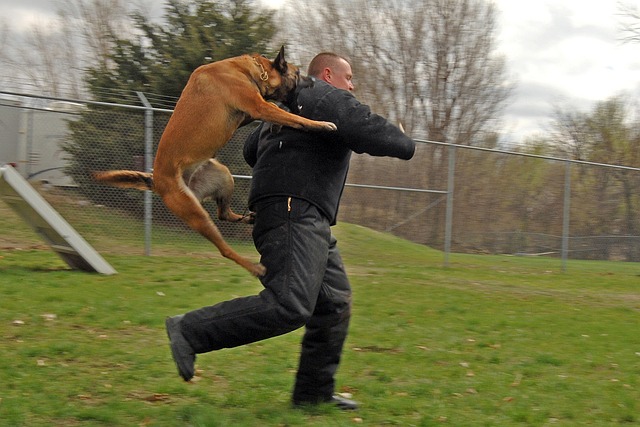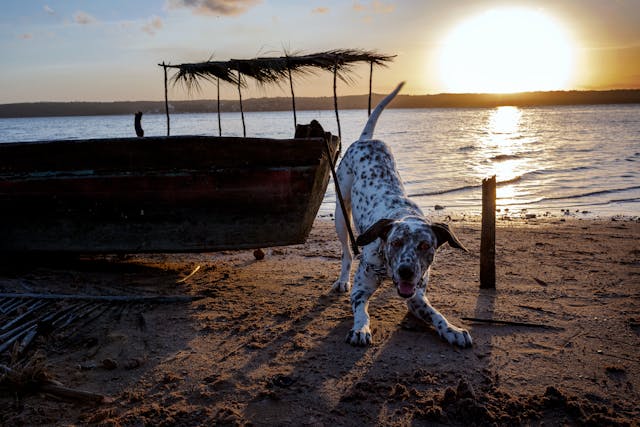In this post, we talk about what to do when a dog attacks you or a loved one. Dogs are often regarded as man’s best friend, providing companionship, loyalty, and joy to millions of households worldwide. However, in rare instances, dogs may exhibit aggressive behavior, leading to potentially dangerous situations, such as attacks on humans or other animals.
While such incidents are not super common, everyone need to understand how to react the right way if they find themselves in such a predicament. Being prepared and knowing what steps to take can significantly reduce the risk of injury and mitigate the impact of a dog attack.

What to Do When a Dog Attacks You
Below, are some helpful steps you can take to avoid a really bad dog attack situation from becoming out of hand and even deadly.
Assessing the Situation and Maintaining Calmness
In the event of a dog attack, it’s important to remain as calm as possible, despite the instinct to panic or flee. Panicking can escalate the situation and provoke further aggression from the dog.
Instead, focus on assessing the circumstances calmly. Determine whether the dog is acting out of fear, territoriality, or aggression, as this can influence your response.
Avoid making sudden movements or loud noises, as these actions may exacerbate the dog’s aggression. If the dog is showing signs of fear or anxiety, such as growling, barking, or baring its teeth, try to create distance slowly and calmly without turning your back on the animal.
Retreat slowly while maintaining eye contact with the dog, as breaking eye contact can signal submission and embolden the dog to attack.
Protecting Yourself and Seeking Assistance
If a dog attack is imminent and escape is not possible, prioritize protecting yourself from harm. Use whatever means are available to create a barrier between you and the dog, such as a jacket, bag, or nearby object.
Avoid using your hands or limbs to fend off the dog, as this can result in severe injury. Instead, focus on shielding your vital organs and maintaining a defensive posture.
If the dog knocks you to the ground, curl into a ball and protect your head, neck, and face with your arms and hands. Once you are out of immediate danger, seek medical attention promptly, even for seemingly minor injuries, as dog bites can lead to infections and other complications.
It is also important to report the incident to owner/s of the dog and the local authorities or animal control agencies to prevent future attacks and ensure the safety of others in the area.
Understanding the Importance of Prevention and Education
While knowing how to react during a dog attack is crucial, prevention is ultimately the best course of action. Responsible dog ownership, proper training, and socialization can significantly reduce the likelihood of aggressive behavior in dogs.
Educating oneself and others about canine body language, warning signs of aggression, and appropriate interaction with dogs can help prevent misunderstandings and potential attacks.
Advocating for leash laws, responsible breeding practices, and humane treatment of animals can contribute to safer communities for both humans and animals alike.
Support from Personal Injury Lawyers
In the aftermath of a dog attack, victims may face physical injuries, emotional trauma, and financial burdens resulting from medical expenses and lost wages.
In such cases, seeking legal solution with the assistance of personal injury lawyers can be invaluable. These legal professionals specialize in advocating for the rights of victims and pursuing compensation for damages incurred due to negligence or wrongful conduct.
Personal injury lawyers can assess the circumstances of the dog attack, gather evidence, and navigate the complexities of liability laws to pursue a fair settlement or litigation against the responsible parties, such as dog owners or property owners.
They can provide guidance and support throughout the legal process, offering reassurance and peace of mind to victims during a challenging time.
By partnering with experienced personal injury lawyers, dog attack victims can seek justice, hold accountable those responsible for their injuries, and obtain the compensation needed to facilitate their recovery and rehabilitation.

Recognizing the Psychological Impact and Seeking Support
Beyond physical injuries, dog attacks can also have lasting psychological effects on victims. Fear, anxiety, and post-traumatic stress disorder (PTSD) are common psychological responses to such traumatic events.
Victims need to recognize and address these emotional challenges by seeking support from mental health professionals, support groups, or counseling services.
Coping with the aftermath of a dog attack may require time and patience, but by acknowledging and addressing their psychological well-being, victims can gradually reclaim their sense of safety and security.
Responsible Dog Ownership and Community Safety Measures
Preventing dog attacks requires a collective effort from both individuals and communities. Promoting responsible dog ownership practices, such as proper training, socialization, and obedience, can help mitigate the risk of aggressive behavior in dogs.
Implementing community safety measures, such as leash laws, public education campaigns, and reporting mechanisms for aggressive animals, can enhance public safety and prevent future incidents.
By having empathy, understanding, and being a responsible pet owner, we can work towards minimizing the occurrence of dog attacks and promoting good relationships between humans and dogs.
Knowing what to do when faced with a dog attack is essential for personal safety and well-being. By remaining calm, assessing the situation, and taking appropriate actions, individuals can minimize the risk of injury during a dog encounter.
Seeking legal recourse, recognizing the psychological impact, and promoting responsible dog ownership are integral aspects of preventing dog attacks and fostering safer interactions between humans and dogs.
Through education, awareness, and proactive measures, we can empower individuals and communities to navigate dog encounters safely and promote harmonious relationships between humans and their canine companions.
Do you own a dog? Have you ever had them attack you or someone you love? Or, have you ever had a dog attack (or try to attack) you? How did you handle it? Let me know in the comments below.